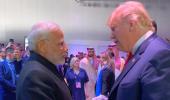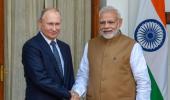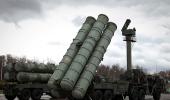India will go by its national interest on S-400 missile defence deal with sanctions-hit Russia, External Affairs Minister S Jaishankar told his United States counterpart Mike Pompeo on Thursday, even as the two sides agreed to work their way through the contentious pact as also other prickly issues, including those related to trade, to take the bilateral ties to new levels.

Holding the first high-level interaction between the two countries after return of the Modi government to power last month, Jaishankar and Pompeo also discussed the issue of energy security in the wake of the situation arising out of US sanctions on buying oil from Iran with the American side assuring New Delhi that it will ensure predictability of energy supply.
The two leaders held talks in one-on-one and delegation-level formats followed by working lunch, and resolved to deepen Indo-US cooperation in combating terrorism, including by strengthening intelligence-sharing.
Later at a joint press interaction, Pompeo and Jaishankar admitted having divergent views on trade, but asserted that friends and large trading partners will have 'issues' which can be resolved.
Hours after his meeting with Jaishankar, Pompeo also made a policy speech at an event here in which he asserted that the world is worse off when religious rights are compromised and called for speaking 'strongly' in favour of religious freedom.
His remarks assume significance as they come days after the State Department, in its annual 2018 International Religious Freedom Report released last week, alleged that mob attacks by violent extremist Hindu groups against minority communities, particularly Muslims, continued in India in 2018, amid rumours that victims had 'traded or killed cows for beef'.
During their talks, Jaishankar and Pompeo also discussed the US-Iran tensions in the Persian Gulf.
"We have a certain perspective on Iran. The Secretary shared with me the American concerns on Iran...For us it is important that global energy supplies remain predictable. I think that is a concern that Secretary Pompeo was very very receptive," Jaishankar said.
On his part, Pompeo articulated American concerns over alleged State-sponsored terrorism by Iran, saying, "We also know that Iran is the world's largest state sponsor of terror, and we know the Indian people, how they have suffered from terror around the world."
Pompeo also said, "I think there is a shared understanding of threat and a common purpose to ensure that we can keep energy at the right prices and deter this threat - not only the threat in the narrow confines of the Middle East, but the threat that this terror regime poses to the entire world."
On the issues of sanctions that India could face under the Countering America's Adversaries Through Sanctions Act (CAATSA) for going ahead with the S-400 deal and trade concerns over tariffs imposed on certain goods by both the countries, Pompeo said, "On each of those two issues, we had a chance to talk today, to try and plot a path forward so that we can do the right thing for both countries."
"They are issues at the moment but we will find a way to work through them. And I know when we come out on the other side, the relationship will be stronger," the US Secretary of State added.
Jaishankar, while responding to the question on the S-400 deal with Russia, said, "I think Secretary Pompeo knows and I have explained to him in some detail that we have relationships with many countries. Many of them are of some standing, they have a history."
"I think we will do what is in our national interest. Again part of that strategic partnership is the ability of each country to comprehend and appreciate the national interest of the other country," he said.
India inked an agreement with Russia in October last year to procure a batch of the missile defence systems at an estimated cost of Rs 40,000 crore.
India went ahead to seal the deal notwithstanding the US' warnings against it. India believes that it meets the US waiver criteria for procuring the S-400 missile defence system from sanctions-hit Russia.
Earlier, Pompeo called on Prime Minister Narendra Modi, who expressed his strong commitment to achieve the full potential of bilateral relations in trade and economy, energy, defence, counter-terrorism and people- to-people contacts.
He also met National Security Advisor Ajit Doval. Pompeo's visit comes ahead of a meeting between Modi and US President Donald Trump on the sidelines of the G20 Summit in Osaka, Japan, later this week.
"On some outstanding issues related to trade, I pushed for a constructive and pragmatic view. The real test of our intentions will be our ability to deal with this," said Jaishankar.
Asserting that 'great friends are bound to have disagreements', Pompeo said the US has been clear in seeking greater market access and the removal of trade barriers in its economic relationship with India.
"We'll keep working to resolve any economic disputes - not only those that we have at this moment, but those that with any significant trading relationship inevitably arise," he said.
Noting that the US-India partnership is beginning to reach new heights, Pompeo asserted that when 1.7 billion people of the worlds two largest democracies come together 'great things' can be done.
Regional issues such as the prevailing situation in Afghanistan, the Gulf and the Indo-Pacific was discussed.
On the Indo-Pacific, Jaishankar said the 'big point' he made during the meeting with Pompeo was that the Indo-Pacific is 'for something not against somebody', in an apparent reference to China.
"That something is peace, stability, security, prosperity and rules. So we are really looking at a landscape where a number of independent players can work together for what they believe is global good," the External Affairs Minister said.
The two sides also discussed the issue of terrorism in detail with the Indian side expressing its appreciation for the 'strong support' received from the Trump administration on combating the menace.
"What we see is zero tolerance on cross-border terrorism. We have of course PM's initiative of a global conference on terrorism and I am sure that is something the US would look at positively," Jaishankar said.
Pompeo said the US is committed to ensuring that India has the military capabilities it needs to uphold its territorial integrity and to confront 21st-century challenges.
"India's own experience with terrorism is very real and we know that. The blasts that ripped through the churches in Sri Lanka have shown that terrorism is a constant in the region and India's ability to fight it should be second to none," Pompeo said.
"Our teams will continue to work together to improve information sharing intelligence sharing to strengthen India's ability to fight terrorism," he said.
Jaishankar also said there was a 'need to filter through the noise and get down to the basics of the relationship'.










